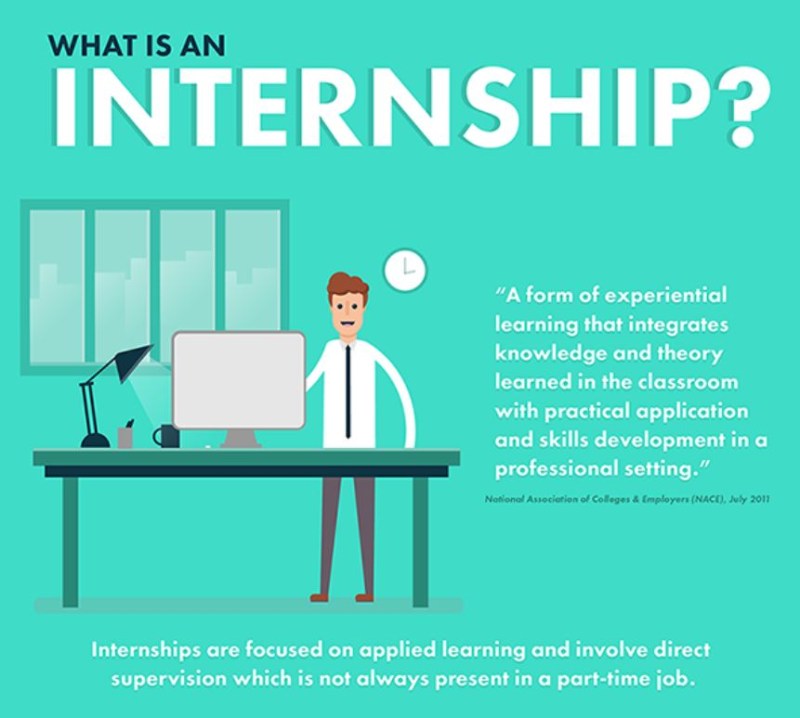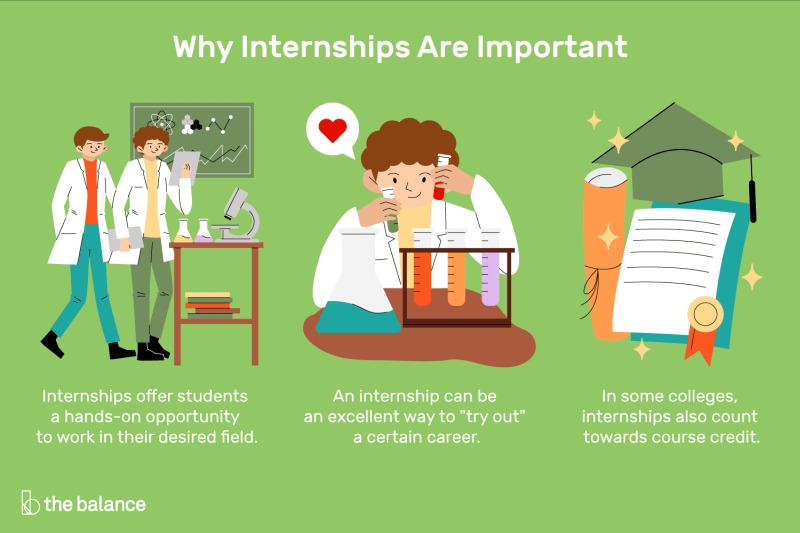Lots of high school kids have part-time jobs, and they’re a great way to earn some cash while learning basic job skills. But if they’re looking to prepare for their future career, an internship could be the way to go instead. Here’s why internships for high school students can be a good idea and how to find them.
What is an internship?

Source: University of Missouri Career Center
Think of an internship as a “job rehearsal.” It’s a chance to explore what working in a specific field or for a specific company can be like. Interns often shadow more experienced workers, first watching and then getting a chance to do different aspects of the job.
Originally, only medical students served internships. Over time, they’ve become popular in a wide variety of fields. They usually involve an application and resume (see terrific examples of high school resumes here), and one or more interviews similar to those you’d undergo for traditional jobs. Many internships are very competitive, since they can open a lot of doors to the future.
What’s the difference between an internship and a job?
An internship generally takes place for only a specified period of time, like a summer, a semester, or a school year. They’re usually filled by students who want to learn more about the field and start making connections as they plan for their future.
Interns are given more opportunities to learn, and there’s often more tolerance for errors. Companies who hire interns are willing to give them a learning experience in exchange for their assistance. Their expectations are lower in terms of performance, and companies usually recognize the need to coach interns on soft skills like behavior and business etiquette as well as career skills.
Are high school internships paid?
Internships can be either paid or unpaid. When they are paid, the compensation is often pretty low, because the focus is on the experience the student is getting. Still, the trade-off can be worth it for the experience and connections they’ll make.
If internships are unpaid, there are specific laws that apply to them. Companies must provide an experience that’s beneficial to the student, rather than just using them as free labor. Students should clarify up-front what’s expected of them in an unpaid internship and what educational experiences they’ll get in return.
What should students expect from an internship?
An internship can be a mixed bag. Some organizations have very structured programs, and interns can expect to be busy learning and doing all day long. In other places, interns might spend part of the day shadowing or getting hands-on experience, while other times they’re handling basic admin work like filing or getting coffee. It’s important to ask up front what skills and experiences a student can expect from an internship, and what duties they’ll take on.
Once a student starts an internship, it’s important to be open to every bit of feedback. They’re there to learn, often from the ground up. They should ask questions, take notes, and observe everything that goes on around them. If students feel they aren’t receiving enough learning benefit, that’s something they can address (professionally) with their manager.
Ask a Manager has lots of terrific posts about intern experiences and questions. Check it out to learn more about expectations, norms, and how to handle potential problems. You’ll also find terrific advice there about resumes and cover letters, job interviews, and student experiences.
What are the benefits of internships for high school students?

Source: M’n Labs
Ask a group of high schoolers what they want to do when they grow up, and at least half of them probably have no clue. And that’s just fine! Others, though, have a very clear career path in mind. Either way, these kids can benefit from internships in a variety of ways.
- Make connections: It’s very true that getting a job is often all about who you know. When students intern at companies they might like to work at in the future, it can open the door to all kinds of opportunities.
- Learn professional behavior: So many kids have no idea what will be expected from them in a “real” job. Fortunately, that’s what internships are all about! Students learn how to dress, how to behave, and other key soft skills. This puts them on an early path to career success.
- Gain job skills: If students have a specific career in mind already, high school internships can give them a good grounding in the basic skills they’ll need. Whether they’re watching and learning or getting hands-on practice, these experiences will pay off one day.
- Clarify future plans: Some kids are completely sure of what they want as a career, until they actually start doing that job and find out it’s not what they expected. For those who are still trying to figure things out, internships can give them a glimpse into different fields and help them find out what interests them.
How can high school students find local internships?
It’s simple enough to find part-time jobs, but internships aren’t always so easy to pin down. If students know what field they’re interested in, they can contact local companies or nonprofit organizations in that field directly. Ask them about potential internship opportunities. If they don’t have a program already, they might be willing to create one for the right student.
Not sure where to start? Here are some general ideas by interest:
- Animal lovers: Zoos and aquariums, wildlife rehab centers, veterinarian clinics, animal shelters
- STEM: Engineering companies, architecture firms, research labs, software developers, science museums, tech companies, graphic designers
- Arts: Performing arts centers, art museums, art or music schools, community theaters
- Communications: Newspapers, magazines, radio stations, websites, public relations agencies
- Finance and sales: Accounting firms, banks, local shops, marketing and advertising firms
- Trades: Auto mechanics, factories, workshops, repair businesses
- Education: Summer camps, libraries, museums, private academies
- Medicine: Hospitals, clinics, rehab facilities, nursing homes
More Internship Opportunities for High Schoolers
For students willing to travel, or those who live in areas near some of these companies and organizations, big-name internships are definitely a possibility. Most of these internships are summer-based and have early application deadlines. Others offer opportunities year-round. Research each for more details.
Adler Planetarium Internship
Chicagoland students can gain professional museum experience when they intern at this top-notch planetarium. (Summer program)
AFRL Scholars Program
Get hands-on experience working with Air Force Research Lab scientists and engineers on the newest technology and research. (Summer program)
Bank of America Student Leaders
Intern at local nonprofits and participate in a national leadership summit to gain practical work and life experience. (Summer program)
Boyce Thompson Institute
Work alongside mentors in the fields of plant-science research and computational biology at Cornell University. (Summer program)
Expanding Horizons Institute
First-generation college-bound Los Angeles–area students can learn about civic responsibilities and gain career-readiness skills at this paid internship. (Summer program)
Geosciences Bridge Program
This program is for geoscience students between their senior year of high school and freshman year of college. It includes lectures, field trips, hands-on activities, and two for-credit college courses, plus stipend, housing, and travel costs. (Summer program)
Global Internships
Those who dream of spending time overseas between graduation and college will find internships around the world in almost any field they can imagine. (Year-round opportunities available)
Hutton Junior Fisheries Biology Program
With placement available in all 50 states, this program is for those interested in fisheries and the aquatic sciences. It includes a stipend and scholar’s summit conference. (Summer program)
Johns Hopkins Internship in Brain Sciences
Students with an interest in neuroscience can work on mentored research projects on campus or virtually. (Summer program)
KP Launch
Discover administrative and supporting healthcare careers at this Kaiser Permanente paid internship, geared toward students from underprivileged and underserved communities. (Summer program)
Library of Congress Internship
Work onsite or virtually to learn about research and writing, exhibition development, outreach, and public programming for libraries and museums. (Summer program)
Microsoft Discovery Program
Students living near Redmond, Washington, can spend the time between high school graduation and the start of their freshman year at college learning programming fundamentals from Microsoft mentors. (Summer program)
NASA Internships
NASA’s Goddard Space Flight Center has internship opportunities at campuses in Maryland, Virginia, NYC, and West Virginia. NASA also offers Pathways Intern Employment Programs at multiple sites. (Dates/times vary by program and position)
New York Historical Society Student Historian Program
Learn about careers in the museum, library, and history fields through this program, which also helps students develop public speaking, leadership, and research skills. (Cohorts available throughout the year)
Scripps Research
Students interested in medical research can gain hands-on experience with health sciences, statistics, and computational/computer science. (Summer program)
Smithsonian Internships
Join the staff at some of the country’s most respected institutions, with a variety of positions and experiences available. (Dates/times vary by position)
Stanford Compression Forum
Get experience with innovative research in a wide variety of areas, mentored by faculty and staff from the program. The program is currently virtual and available across the country. (Summer program)
The Met Summer Internships
Students in New York, New Jersey, or Connecticut can learn about art, marketing, editorial, social media, and conservation from creative professionals at one of the most prestigious museums in the nation. (Summer program)




















